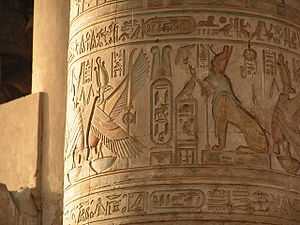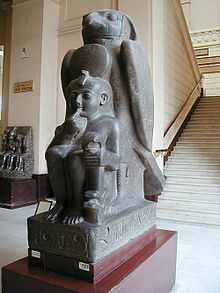Child (hieroglyph)
| ||
| Child in hieroglyphs |
|---|
| ||
| Child (as Pharaoh) in hieroglyphs |
|---|
The ancient Egyptian child hieroglyph is part of the Egyptian Gardiner's Sign List hieroglyphs for the beginning core subgroup of Man and his Occupations. It relates to the child, and childhood, and has a version for the Pharaoh, as a child.
Language usage of child
The hieroglyphic equivalent of the child hieroglyph is nn as a phonogram. It is the Ancient Egyptian language equivalent of hrd-(meaning "child").[1] The hieroglyph is also a determinative in words relating to childhood;[2] (also an abbreviation for "child").[2]
Rosetta Stone usage

The child hieroglyph is used twice in the 196 BC Ptolemy V Rosetta Stone. It is used in the introduction, line 1, (Nubayrah Stele, line N1), with the youth reference:
- "....month two of the season Pert, day 18, under the Majesty, of the Horus-Ra, the Youth, like a king upon the throne of his father...."[3]
After the Rosetta-Stone-stele text lists the 22 reasons for honoring Ptolemy V, the gods and goddesses reward Pharaoh:
- ''".... As a reward for these things have given him (Ptolemy V) the gods and goddesses: victory, might, life, strength, health, (AUS) and everything good to the fullest possible extent of them; is his rank great established for him and his children for ever."[4]
Gallery
See also
- Gardiner's Sign List#A. Man and his Occupations
References
| Wikimedia Commons has media related to Child, "nn" (hieroglyph). |
- Betrò, 1995. Hieroglyphics: The Writings of Ancient Egypt, Maria Carmela Betrò, c. 1995, 1996-(English), Abbeville Press Publishers, New York, London, Paris (hardcover, ISBN 0-7892-0232-8)
- Budge, 1989, (1929). The Rosetta Stone, E.A.Wallace Budge, (Dover Publications), c 1929, Dover edition(unabridged), 1989. (softcover, ISBN 0-486-26163-8)




